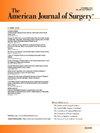Impact of sleep disturbances due to low anterior resection syndrome on the quality of life of patients with rectal cancer
IF 2.7
3区 医学
Q1 SURGERY
引用次数: 0
Abstract
Purpose
We aimed to analyze the effects of nighttime symptoms on quality of life of patients with low anterior resection syndrome (LARS) and determine the correlation between nighttime symptoms and insomnia.
Methods
A single-center observational study was conducted on patients with rectal adenocarcinoma who underwent sphincter-preserving surgery at Seoul National University Hospital between 2019 and 2023. Eligible patients were surveyed during routine outpatient follow-up. The primary outcomes were bowel function assessed by the Low Anterior Resection Syndrome (LARS) score including nighttime symptoms and sleep disturbance evaluated using the Insomnia Severity Index (ISI).
Results
Among 100 patients, 85 (85.0 %), nine (9.0 %), and six (6.0 %) underwent low anterior, ultra-low anterior, and intersphincteric resection, respectively; 86 (86.0 %) had LARS, and 58 (58.0 %) had nighttime symptoms. Further, 69 patients (98.6 %) met the criteria for insomnia. The LARS score and ISI were positively correlated (p = 0.047). Differences in the frequency of bowel movements (p = 0.015) and nighttime symptoms (p = 0.046) were noted between the no/mild insomnia and moderate/severe insomnia groups. Physical and social functioning were lower (p = 0.004 and p = 0.007, respectively) and stool frequency (p = 0.018), embarrassment caused by defecation pattern (p = 0.025), and sore skin around the anus (p = 0.006) were more severe in the moderate/severe insomnia group.
Conclusions
LARS and insomnia showed a significant correlation; no significant correlation was found between the occurrence of nighttime symptoms and insomnia.
低位前切综合征所致睡眠障碍对直肠癌患者生活质量的影响
目的分析夜间症状对低位前切除术综合征(LARS)患者生活质量的影响,探讨夜间症状与失眠的相关性。方法对2019 - 2023年在首尔大学医院行保留括约肌手术的直肠腺癌患者进行单中心观察研究。在常规门诊随访中对符合条件的患者进行调查。主要结局是通过低前切除术综合征(LARS)评分评估肠道功能,包括夜间症状和使用失眠严重指数(ISI)评估睡眠障碍。结果100例患者中,分别有85例(85.0%)、9例(9.0%)和6例(6.0%)行低位前路、超低前路和括约肌间切除术;86例(86.0%)有LARS, 58例(58.0%)有夜间症状。此外,69例(98.6%)患者符合失眠标准。LARS评分与ISI呈正相关(p = 0.047)。无/轻度失眠症组和中度/重度失眠症组在排便频率(p = 0.015)和夜间症状(p = 0.046)方面存在差异。中重度失眠症组的身体和社交功能较低(p = 0.004和p = 0.007),排便频率较低(p = 0.018),排便方式引起的尴尬(p = 0.025),肛门周围皮肤疼痛(p = 0.006)较严重。结论slars与失眠有显著相关性;夜间症状的发生与失眠之间没有明显的相关性。
本文章由计算机程序翻译,如有差异,请以英文原文为准。
求助全文
约1分钟内获得全文
求助全文
来源期刊
CiteScore
5.00
自引率
6.70%
发文量
570
审稿时长
56 days
期刊介绍:
The American Journal of Surgery® is a peer-reviewed journal designed for the general surgeon who performs abdominal, cancer, vascular, head and neck, breast, colorectal, and other forms of surgery. AJS is the official journal of 7 major surgical societies* and publishes their official papers as well as independently submitted clinical studies, editorials, reviews, brief reports, correspondence and book reviews.

 求助内容:
求助内容: 应助结果提醒方式:
应助结果提醒方式:


